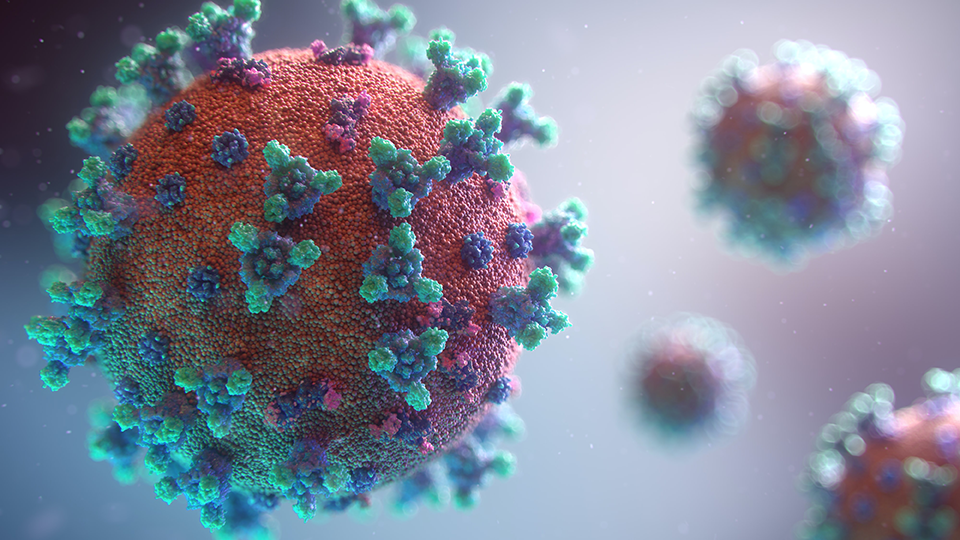You may have heard a lot of news recently about Long-term COVID-19 (Long COVID). This occurs when people continue to experience health issues well after contracting COVID-19.
While this condition is new, the concept of long-term health issues from a virus is not. It’s called Chronic Viral Syndrome, and it can have serious implications for long-term health if not properly treated.
What is Chronic Viral Syndrome?

It’s natural to assume that once the acuteness of the illness passes, it’s gone; however, this is not the case with viruses. They can lie dormant in the body for years. Plus, symptoms aren’t necessarily what they were when the virus was acute.
This can make diagnosis particularly challenging because many physicians focus on treating symptoms rather than looking for underlying causes, even when their patients continue to suffer.
Another example is the Epstein-Barr Virus (EBV). A very young patient contracting this virus may only experience flu-like symptoms for a few days. If infected by this virus in the teens or early twenties, it can present as Mononucleosis or the “kissing” disease. This is one of the most common viruses that resurface and become chronic.
If the immune system becomes weakened or other triggers occur, these viruses can reactivate and become problematic. In the case of Epstein-Barr and COVID-19, it’s possible that the virus can create symptoms associated with either Chronic Fatigue Syndrome (CFS) or Fibromyalgia.
Chronic Viral Syndrome can weaken your immune system, leaving you susceptible to other infections and diseases.
At Renewed Vitality, we can treat your chronic viral illness so you can regain a healthy life.
Call us to learn more: (214) 740-4703.
Common Chronic Viral Syndrome Viruses
The most common chronic viral syndromes stem from variations of the Herpes Virus. Most people think of these as either recurring fever blisters (Herpes Simplex 1) or as a sexually transmitted disease that affects the genitals (Herpes Simplex 2), but there are others as well:
- Varicella Virus (Herpes Virus 3) – Chicken Pox/Shingles
- Epstein-Barr Virus (Herpes Virus 4)
- Cytomegalovirus (Herpes Virus 5) – a dangerous virus that can affect many systems: brain, sinuses, retinas, esophagus, stomach, intestines, liver, and skin
- Herpes Viruses 6 and 7 – Immune system viruses
Other viruses that commonly lead to Chronic Viral Syndrome are:
- Parvo Virus – a virus that in human form affects the skin and immune system
- Coxsackie Virus A & B – (Hand and Mouth Disease/Slapped Face Disease)
Most people have been exposed to at least some of these viruses. When dormant, they can be stored in organs, cells, or both. There, they can weaken the immune system and leave the body susceptible to other infections.
In recent years, much more research has been done on chronic viral infections. You can find more information about this research HERE.
Other Common Viruses and Their Impact
Besides the herpes viruses mentioned above, the following are some of the more common viruses. Understanding these viruses can help you better manage them or prevent them.
COVID-19
COVID-19 transmission occurs primarily through respiratory droplets from coughs, sneezes, or conversations and, to a lesser extent, contact with contaminated surfaces. The virus impacts the respiratory system, presenting a range of symptoms from mild to severe, including fever, cough, and, in critical cases, acute respiratory distress syndrome.
COVID-19 can also lead to prolonged health issues, known as Long COVID, which may include fatigue, joint pain, and cognitive disturbances persisting months after recovery. Along with our Chronic Viral Syndrome care, we offer comprehensive COVID-19 care at Renewed Vitality. Learn more HERE.
 Influenza (Flu)
Influenza (Flu)
Influenza typically causes acute illness, but in rare cases, it can contribute to chronic symptoms. Millions of people are affected by the flu every year, but the severity and prevalence of outbreaks vary from year to year. The virus is highly contagious, primarily spreading through respiratory droplets.
Influenza primarily targets the respiratory system, causing symptoms ranging from fever and cough to severe complications like pneumonia. While most recover without lasting effects, some can face significant risks, including post-viral syndrome.
Hepatitis
Hepatitis is a group of viruses (A, B, C, D, E) that target the liver. Each virus has different transmission methods and impacts on health. Acute hepatitis A and E are frequently caused by contaminated food or water. Chronic hepatitis B, C, and D can cause serious liver damage, including cirrhosis and cancer.
Preventive measures vary by type, including vaccinations for A and B, safe sexual practices, and avoiding needle sharing. Treatment aims to manage symptoms and prevent liver complications. Supportive care is used for A and E, while antiviral medications are used for B and C. Hepatitis D management involves treating the underlying hepatitis B infection, underscoring the importance of preventive practices to mitigate these infections’ impact.
HIV/AIDS
HIV continues to be a significant global health challenge, with approximately 38 million people living with HIV by the end of 2019. However, with modern treatment, HIV can be managed effectively. The virus spreads through the exchange of body fluids, attacking the immune system and progressively diminishing its ability to fight infections.
Without treatment, HIV can advance to AIDS, severely limiting life expectancy, especially following opportunistic infections. Long-term complications of untreated HIV include increased risk of various diseases, highlighting the importance of antiretroviral therapy (ART), which can effectively manage the virus, preventing its progression to AIDS and enabling individuals to lead healthy lives
Zika Virus
The Zika virus drew global attention during the 2015-2016 outbreak, primarily transmitted through Aedes mosquito bites. This virus can cause serious birth defects, such as microcephaly, when pregnant women are infected. Though infections are usually mild, there is a risk to pregnancies and the potential for Guillain-Barré syndrome.
Prevention focuses on mosquito bite avoidance, using repellents, wearing protective clothing, and managing standing water. With no specific treatment or vaccine available, efforts are aimed at symptom relief and preventing transmission, particularly in pregnant women or those planning pregnancy.
 How Can Viruses Resurface and Become Chronic?
How Can Viruses Resurface and Become Chronic?
The most widespread cause of a virus reactivating and becoming chronic is a weakened or compromised immune system. Contracting a different virus can also reactivate a dormant virus, creating a cascade effect of stress on the immune system.
Many things can overtax the immune system, including:
- Severe illnesses, such as cancer, COVID-19, or another serious immune-compromising sickness
- Diets high in sugars, simple carbohydrates, and processed foods
- Exposure to toxins in the food we eat, our environment, pesticides, and other chemicals
- Sudden physical or emotional upsets
- Sleep deprivation
- Alcohol/drug/tobacco abuse
- Obesity or overall poor physical health
Symptoms of Chronic Viral Syndrome
In the beginning stages of Chronic Viral Syndrome, symptoms are usually very mild. It may take a while to realize that something is wrong.
Over time, other symptoms may also appear and get much worse and debilitating. They can be difficult to diagnose because symptoms are often broad and non-specific.
Unless a physician has the wherewithal to look for underlying causes, the patient can experience a lot of unnecessary anguish. Symptoms can include:
- Recurring respiratory problems such as asthma or sinus infections
- Persistent low-grade fevers
- Joint pain (with or without swelling)
- Widespread muscle pain
- Rashes and hives
- Irritable Bowel Syndrome (IBS)
- Relentless fatigue
- Chronic candida (yeast) infections
- Sore throat
- Bloating, gas, and heartburn
While these illnesses can affect anyone from any age or ethnic group, the largest groups of people affected by these disorders are people who take care of or work with children: elementary and preschool teachers, pediatric nurses, dentists and their assistants, and daycare workers. Because many of these people are women, it is no surprise that most of those affected by these viral disorders are women.
We Can Help You Achieve Long-Term Relief
At Renewed Vitality, we will test for and address the root causes of your symptoms to determine what exactly is causing them. We also provide hormonal and nutritional support to repair your immune system. Treatments include:
- repairing the immune system (hormone and nutritional support)
- antiviral prescription medications
- Super Viral IVs
- natural supplements that boost the immune system
Most patients can return to a normal life after completing a full course of therapy.
Unfortunately, medical science has not found a way of eradicating these viral invaders. They incorporate themselves into our DNA and become little “virus factories.”
With chronic viruses, you may need to take certain medications for the rest of your life to prevent the infection from coming back. These long-term treatments are not harmful but must be monitored by physicians who thoroughly understand them.
Dr. Spurlock has over 23 years of experience in viral diseases. He specializes in treating Chronic Viral Syndrome, Fibromyalgia, and Chronic Fatigue Syndrome (CFS). He is also an expert in body detoxification, weight-loss management, and sleep therapy.
Dr. Spurlock and our staff can help you find the right treatments to restore you to the healthy, active person you want to be.
Call us today for a no-obligation phone consultation.
(214) 389-1234
Or complete the form below and we will contact you.





